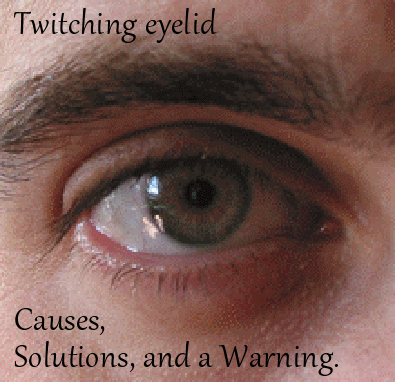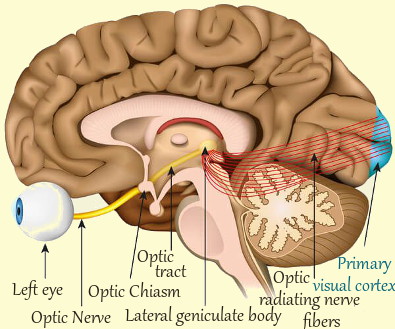
There are nerves galore in and around our eyes, a really huge number.
Basically, nerves need vitamin B12 to be healthy, and happy… i.e. not twitching. If your eyelid begins twitching it could be because you’re under a lot of stress and have used up your stores of vitamin B12.
When someone is severely low on vitamin B12, nerves below the skin on their legs can begin twitching. I had that before I knew much about B12. It used to feel as if a small animal was trapped and trying to get out. Not that it was a biting pain, more like a really uncomfortable feeling.
In the case of our eyes, the optic nerve to each eye is a bundle of between 770,000 and 1.7 million axons, or nerve fibers connecting our eyes to our brains with visual messages.

Damage to the optic nerve can cause vision loss. That probably goes without saying. But, keep in mind that when stress reduces vitamin B12 levels, or you simply aren’t eating enough B12 foods, you can have fuzzy vision.
I know from my extensive experience with stress, that one of the first signs of needing more B12 to help me deal with the stress… is blurry vision.
Don’t ignore fuzzy/blurry vision. Take it as a sign you need more B12, more rest, and maybe a full out change in diet to include eating B12 rich foods every day. Otherwise a point of significant loss will come, and with it, almost inevitably, blindness.
As an aside, my eyelid can begin twitching quite unexpectedly and without my vision being blurry. Usually this happens when something in my immediate experience is stressful. For instance, I may find a person I had trusted telling me things that go against my ethics.
Overall, when I’ve been paying attention to eating B12 rich foods, supplementing with methylcobalamin, and I’m pretty sure my B12 levels are healthy, I very rarely find my eyelids twitching.
Be aware…
There are certain optic nerve problems that are very serious and can be accompanied by eyelid spasms. So, if you increase your B12 intake, relax so that stress isn’t harming you with its vice like grip, and still have twitching accompanied by red eyes, blurry vision, nausea, headache, and even eye pain, then you may have the beginning of glaucoma, which in many cases is caused by abnormally high pressure in the eye.
According to the Glaucoma Research Foundation 60 million people, worldwide, have vision loss due to glaucoma.
The good news is that early diagnosis and treatment make all the difference in avoiding vision loss, not just from glaucoma, but from that and other of the eye problems that can result in blindness.
Advice from KISS drummer
Kaite Heany wrote an entertaining piece about twitching eyelids for The Atlantic, Health, in which she talked about Randy McLaughlin, an optometrist at Ohio State University Wexner Medical Center who ended her interview with him saying that just before he talked to her he’d been on the phone with his friend Eric Singer, drummer for KISS (and formerly, for Black Sabbath).
McLaughlin said that when he told Singer about the coming interview about causes of eye twitching, Singer said, “That’s easy. You don’t get enough sleep, too much caffeine, and you’re stressed, and you need to adjust your diet.”
Heany ended her piece, “And if the drummer for KISS says so, it must be true.”
P.S. Vitamin A for dry eyes
If dry eyes are a problem, then vitamin A helps.
I forget how I discovered this in my life, but well before computers accessing the internet became a thing I told my neighbor about it.
She was a licensed clinical social worker, retired, and her ex husband was a Los Alamos scientist, so I wasn’t surprised when she came back a week or so later and said she’d told her doctor what I’d said.
I felt a little “turned in” when she said she told her doctor. But then she said her doctor had agreed, advising her to begin using vitamin A for her dry eyes.
Vitamin C for cataracts
Some years ago I got Solatube to bring natural sunlight in for my plants. I didn’t realize that the lense had been engineered to keep out the fabric fading rays in sunlight. So, it wasn’t all that helpful for my plants which need those exact rays, but it was great for simply adding natural light.
Problem was, I kept looking at the polished, highly reflective aluminum even after I began to realize it was Awfully bright. The result was cataracts. My vision became extremely cloudy, especially if there was much light.
I had to wear a brimmed hat in the house just to be able to see relatively clearly.
As you can imagine, I was distraught that I’d so foolishly damaged my eyes.
It seemed hopeless, but I researched cataracts nonetheless. And, to my surprise I found extensive information saying that vitamin C can slow the formation of cataracts and better still, can reduce the plaque that causes them in ones already formed.
I tried it, and sure enough.
However, a couple years later I was living with extreme stress and… Darn it!!! my cataracts came back full force.
This time vitamin C did not reduce them as significantly as the first time.
I was wallowing in misery about it on Twitter when a friend in Scotland said to use a drop of honey in each eye. Her 92 year old aunt did that for decades and could still thread a needle without glasses.
So, of course I tried it. Just to be clear… it stings. (LOL, I suppose that’s a message from the bees???) And yes, it helps. But like the vitamin C, it has not totally eliminated the cataracts.
When I researched it I found a study that showed honey does, in fact, help. But, by then I knew that from experience.
Credit for Gif
Chris Fahey’s vibrating eyelid http://www.graphpaper.com/2007/05-24_vibrating-eyelid/
